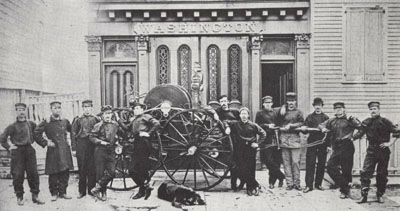No answers from the Know Nothings
Boston and Massachusetts as a whole have made some strides toward racial harmony in the past few decades. But we still face what some politicians like to refer to as the “civil rights issue of the 21st century”: education. Fact is from the time of Brown v. the Board of Education, education has always been the civil rights issue.
Our history with tolerance has, as we know too well, high points and some really low points. At the same time that we nested some of the early abolitionists, we became a stronghold of vituperative anti-Catholicism. The picture above shows one of the brutal emanations of that intolerance: the Plug Uglies. The Plug Uglies’name was fitting, indeed; commissioned by the Know Nothing party in the mid-1850s, they traveled the country scaring the Irish from voting booths in their best humors. When particularly engaged, they came armed with guns, clubs, and (you see it there!) cannons. The did not stop with commandeering voting areas; no, they created mayhem, beating Irish people who dared consider voting, and worse. (Nor did they simply treat the Irish this way, including black citizens in more than one locale.)
The history of the Know Nothings was oddly contradictory in Massachusetts:
In no state did the American party reap as much success as in Massachusetts. In 1854 the Party captured the governor’s office, the entire state senate, and virtually the entire state house of representatives.
The Massachusetts’ Know Nothings were indeed intolerant and supportive of efforts by the Plug Uglies, but they seem to have found some sort of odd balance in their minds by opposing the federal Fugitive Slave Act.
The Know-Nothings’ most enduring accomplishment is an amendment to the Massachusetts Constitution that survives to this day in modified form, commonly known as the “Anti-Aid Amendment.” The Anti-Aid Amendment provided for the first time that state appropriations and local tax revenues for education could be “expended in, no other schools than those which are conducted according to law, under the order and superintendence of the authorities of the town or city in which the money is to be expended; and such moneys shall never be appropriated to any religious sect for the maintenance exclusively of its own schools.”
By the 20th Century, at a time when Protestant power was waning fast in Massachusetts, renewed groups of anti-Catholics sprouted up “similar in outlook to the KnowNothings, the most ambitious being the American Protective Association.”
The 1917 Amendment to the Anti-Aid Amendment is sometimes characterized as a purgative that cured the Anti-Aid Amendment of its anti-Catholic bias because henceforth its prohibition would apply to all charitable institutions, not just schools, with limited exceptions.
Pages 7-9 of this study of the 1917 Anti-Aid amendment make fascinating reading and dismantle the usual case made, which is that this Progressive Era amendment was “ecumenical” and repaired the shameful origin and intent of the original Know Nothing amendment. Not.
Today vouchers cannot be used to send children to private schools. (Some argue even tax credits are not allowed under the Anti-Aid amendment.) And the fact is that the Anti-Aid amendment came into being as part of a compromise with Progressive Era politicians, who wanted a ballot initiative process to be enshrined in the state constitution. (That ballot initiative is now under attack by big labor in Massachusetts and across the country.) The ballot initiative was ultimately adopted as a constitutional amendment, but for the Progressives to get that, they had to give on the Anti-Aid Amendment. Chapman notes:
In Massachusetts, the injury is compounded by the fact that the same Constitutional Convention that approved the 1917 Amendment also voted to give the people of the state the right of initiative—a process by which legislation can be proposed by citizens and placed on a statewide ballot for approval by popular vote without going through the traditional legislative process—but prohibited its use to amend the Anti-Aid Amendment.
The right of initiative was promoted by the Progressive Party as a means of countering business domination of state legislatures by giving ordinary citizens the right to craft legislation directly.
The Progressive Party had achieved sufficient electoral gains in Massachusetts at the time of the 1917 Constitutional Convention for its votes to be needed by the proponents of the 1917 Amendment, and the initiative procedure was approved by the 1917 Constitutional Convention with a unique limitation; it could not be used to repeal either the Anti-Aid Amendment, or the provision barring its use to repeal the Anti-Aid Amendment.
This double impediment to potential popular repeal or modification of the Anti-Aid Amendment violates the principle of Romer v. Evans that “government and each of its parts remain open on impartial terms to all who seek its assistance.”
For those who are ideological on the point of school choice, and who want to hew closely to the Know-Nothing amendments and the 1917 follow-on which does not even allow a ballot petition to overturn the mid-19th-century bigotry, I’d ask you to consider these questions:
- Would you deny a college student a state or federal grant, scholarship, or loan to attend the College of the Holy Cross, Boston College, Notre Dame, or Brandeis? According to the language of the 1917 amendment, that’s precisely what you would have to conclude.
- In Massachusetts today the delivery of special education is often provided through private institutions. Are opponents of school choice and those cloaking themselves in the mantel of the Know-Nothing and 1917 amendments ready to see us pull all of those children into district schools?
Yeah, I thought that would be your answer.


